-
 Art of Wellness Acupuncture & Traditional Chinese Medicine (TCM)11704 Wilshire Blvd, Suite 295, Los Angeles, CA, 90025
Art of Wellness Acupuncture & Traditional Chinese Medicine (TCM)11704 Wilshire Blvd, Suite 295, Los Angeles, CA, 90025
myartofwellness@gmail.com310-451-5522 Office Hours
MonClosedTue7:30 am --4 pmWed7:30 am --4 pmThu7:30 am -- 4 pmFri7:30 am -- 4 pmSat7:30 am -- 4 pmSunClosedOur office opens from Tuesdays to Saturdays 7:30 am to 4 pm, will be closed on Memorial day, Independent day, Labor day, Thanksgiving day, Christmas and New year.
-
Recent Posts
- How to Treat Rosacea With Acupuncture and TCM
- How to Treat Perioral Dermatitis With Acupuncture and TCM
- Lymphatic Drainage With Acupuncture and TCM
- How to Treat Turf Toe With Acupuncture
- How to Treat Nerve Pain With Acupuncture and TCM
- How to Treat Watery Eyes With Acupuncture and TCM
- How to Treat Ovarian Cysts With Acupuncture and TCM
- How to Treat Dystonia With Acupuncture and TCM
- Can Acupuncture Help Bad Breath?
- How to Treat Atopy with Acupuncture and TCM
- Plantar Fasciosis Treatment With Acupuncture and TCM
- How to Protect Yourself When Air Quality Is Poor
- How to Treat Spinal Headache With Acupuncture and TCM
- How to Treat Sarcoidosis With Acupuncture and TCM
- How to Treat Flu With Acupuncture and TCM
- Chinese New Year 2025 Year of the Snake
- Sign up to receive news and updates and get my free report:“The Top 10 Reasons to Try Acupuncture”

July 2025 M T W T F S S 1 2 3 4 5 6 7 8 9 10 11 12 13 14 15 16 17 18 19 20 21 22 23 24 25 26 27 28 29 30 31
Depression
How to Treat Musculoskeletal Pain With Acupuncture and TCM
By Qineng Tan, L.Ac., Ph.D. & Xiaomei Cai, L.Ac., Ph.D.

Do you experience unexplained pain all over the body? Muscle pain and tenderness, along with feeling tired all the time and having mood issues? Widespread musculoskeletal pain accompanied by fatigue or feeling exhausted may be a sign you have fibromyalgia. Alternative medicine methods like Acupuncture and TCM offer a way to help ease the chronic pain, sleep problems, and emotional disturbances caused by fibromyalgia.
Fibromyalgia (sometimes referred to as “fibro” or FM) is one of the most common chronic pain conditions worldwide, affecting an estimated 10 million people in the United States alone. Still, this chronic condition is still not well understood by medical science. There are no definitive tests to show whether or not fibromyalgia is the cause of pain all over the body along with chronic fatigue, so many people go on having musculoskeletal problems and hurting all over without being diagnosed or treated. There are many people who have fibromyalgia who also suffer from depression and anxiety related to the illness. Fibromyalgia can dramatically impact a person’s quality of life. While people of ages and genders can have fibromyalgia, it is much more prevalent among women.
Fibromyalgia is considered to be a syndrome: a collection of symptoms that often occur together. Fibromyalgia is associated with other conditions like lupus, rheumatoid arthritis (RA), myofascial pain syndrome, and myalgic encephalomyelitis/chronic fatigue syndrome (ME/CFS). It may coexist with these other chronic conditions, or sometimes be mistaken for one of them. However, fibromyalgia is now understood by medical professionals to be its own distinct condition with specific manifestations.
People who have RA have been shown to have an increased risk for also having fibromyalgia. But the quality and location of the musculoskeletal pain differentiates the two conditions. The pain of fibromyalgia shows up in the musculoskeletal system in the areas where there are large muscles, causing pain that may move around throughout the torso, back, hips, thighs and arms. Fibromyalgia pain is often described as a kind of “tenderness,” or when the body aches all over. “Tender points” all over the body are specific to fibromyalgia. This is different from arthritis, which generally causes swelling and pain in the joints. Both RA and lupus are understood to be caused by inflammation, while fibromyalgia is believed to be caused by a problem with the central nervous system (CNS), in which pain signals are amplified, causing extreme sensitivity and pain, even when there is no seeming reason for that area of the body to feel pain.
Some of the fibromyalgia symptoms are very similar to those of myalgic encephalomyelitis (ME), which is also known as chronic fatigue (CFS). As with RA and lupus, the two conditions can overlap. The difference is that the overwhelming symptoms of ME/CFS are related to fatigue or post-exertional malaise (PEM), while the predominant symptom of fibromyalgia is widespread muscle pain and tenderness.
Fibromyalgia seems to show up in some people due to a traumatic or triggering event. There can then be a fibromyalgia flare up due to the presence of other triggers later.
Fortunately, acupuncture, herbs, and other forms of alternative medicine that fall under TCM can approach all of the different symptoms of fibromyalgia holistically. Acupuncture is widely accepted to be effective for helping musculoskeletal conditions of all kinds, as well as neurological problems, rheumatological conditions, sleep issues, and emotional and mental health disorders.
Top 10 Symptoms of Musculoskeletal Pain

As a syndrome, fibromyalgia may manifest as any combination of a few or several of a variety of symptoms. The most common symptoms of fibromyalgia include:
- Widespread musculoskeletal pain: pain, tenderness, and/or stiffness in the muscles all over the body that may come and go or migrate from one area to another
- Fatigue, exhaustion, extreme tiredness
- Emotional and/or mental issues: depression, anxiety, PTSD
- Sleep problems, insomnia
- Cognitive issues: difficulty concentrating, memory problems, “fibro fog”
- Headaches, migraines
- Neuropathy: tingling or numbness in the hands and/or feet
- TMJ, jaw pain
- Digestive problems: irritable bowel syndrome (IBS), abdominal pain, bloating
- Bladder pain, interstitial cystitis
Other more subtle signs of fibromyalgia can include: itching all over, a skin crawling sensation (like bugs crawling on skin), extra sensitivity to smells or temperature, a tendency to shiver, or dry eyes or eye pain.
Top 5 Causes Musculoskeletal Pain Flares
The symptoms of fibromyalgia tend to come and go. Some days a person might feel almost totally fine, then other days, the fibromyalgia flares, causing more pain, exhaustion, and sometimes other symptoms. What triggers a fibromyalgia flare up?
- Hormonal changes during menstrual cycle, miscarriage, pregnancy, or postpartum
- Prolonged stress
- A sudden traumatic event, PTSD trigger, panic attack
- Changes in weather: temperature, humidity, barometric pressure
- Lack of sleep
When one of the 18 tender points of fibromyalgia is touched, it can trigger more widespread pain. These points include areas like: the front and sides of the neck, the base of the skull, the elbow, and the backs of the knees.
What Is the Treatment for Fibromyalgia?
Medical treatment for fibromyalgia typically involves a combination of medicine to alleviate pain with psychological support and lifestyle management. Drugs like Lyrica, Cymbalta, and Savella are approved for prescription for patients with fibromyalgia. Lyrica and Cymbalta are also used to treat conditions that involve nerve damage or nerve pain, like diabetes, neuropathy, shingles, while Savella works in a way that is similar to antidepressants. Other pain relievers and/or antidepressant medications may also be prescribed to help people manage pain of fibromyalgia, help them sleep better, and boost mood. All of these medications can come with unwanted side effects, and they do not help to relieve pain in every case.
People with FM pain will often receive counseling on how to manage their condition by being very careful not to exert themselves or become exhausted. Getting quality sleep and reducing stress can help to prevent fibro flare up. It can be hard for people to follow guidelines that ask them to make major lifestyle changes. Fortunately, acupuncture, herbs, and the patient support of a TCM practitioner can offer more help for people with fibromyalgia.
Acupuncture for Musculoskeletal Pain
Can acupuncture help fibromyalgia? Yes. TCM offers a comprehensive system for managing musculoskeletal pain and chronic pain, helping to heal nerve damage and restore central nervous system function, supporting mental health, relieving anxiety and depression, and addressing sleep problems. Whereas with conventional medicine, a patient might go from one doctor to another to handle all of these issues, the acupuncturist can address them all at once. The TCM point of view always takes into consideration the connection between what is going on physically with what is going on emotionally in each individual, so it is really an excellent way to help patients with fibromyalgia.

Like Western medicine, TCM recognizes that sometimes fibromyalgia can be originally caused by a traumatic event or an extremely stressful time in one’s life. Emotional upheavals cause stress to the liver, which in turn causes stagnation of blood and Qi. TCM also sees coldness and dampness as pathogenic forces that can have a profound effect on overall health. According to TCM, widespread musculoskeletal pain falls under the category of Bi Syndrome. In Bi Syndromes, cold and damp get into the body and take hold on a deep level, causing pain and stiffness. With acupuncture treatment for fibromyalgia, we seek to clear cold and damp, and restore good flow of Qi and blood throughout the body.
Acupuncture has an analgesic effect, relieving muscle pain without side effects. Moxibustion may be utilized to bring warmth to areas of the body. Cupping is another modality used to draw out damp cold and improve blood flow. Tai Qi and Qi Gong, gentle therapeutic movement practices that have been developed over 1000s of years as part of TCM, also may offer great benefits for people with FM.
A systematic review of over 400 studies of fibromyalgia treatment with TCM, acupuncture treatment was found to be effective for reducing both short term pain and long term pain.
Another review found that acupuncture and herbs worked better to reduce pain than standard medication therapy.
Top 5 Tips for Managing Fibromyalgia
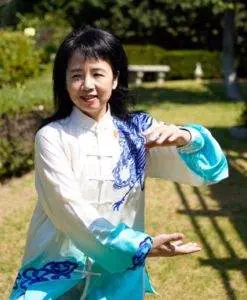
Dealing with fibromyalgia and seeing significant improvement in fibro pain will probably involve making some lasting lifestyle changes. Making adjustments to your sleep habits, food choices, and your exercise routine can make a difference in preventing the next FM flare up.
- Choose a gentle, enjoyable form of exercise. Start slowly, and gradually increase the amount you can exercise over time. Walking outdoors is a great option, as are Tai Qi and Qi Gong.
- Limit or eliminate caffeine and alcohol. These substances can interfere with getting good sleep and exacerbate liver problems. Alcohol is not safe to consume if you are taking medications for fibromyalgia like Lyrica, Cymbalta, and Savella.
- Avoid sugar, which may give you a short-lived good feeling, but will lead to a “sugar crash,” and feeling more exhausted than before. Any kind of simple carbohydrates, like foods made of white flour, or bottled fruit juices, can cause highs and lows in blood sugar. Avoid sugar substitutes and food additives like MSG, which can trigger reactions in some people.
- Focus on eating complex carbohydrates, especially vegetables. These help you have a more sustained energy throughout the day. Nuts and seeds are also good.
- Warm baths with Epsom salts can be very soothing.
Getting enough sleep at night, and even resting or napping during the day, may be essential to your well-being if you have fibromyalgia. Develop habits that allow for plenty of rest and set yourself up for a good night’s sleep.
Acupuncture Near Me for Musculoskeletal Pain
Many people who have fibromyalgia choose to try alternative medicine as a way of managing FM pain. Physiological conditions that stem from emotional stress are often not resolved through the use of medications. Acupuncture and TCM have a long history of helping people to heal from emotional disturbances that cause physical pain. Acupuncture treatment works to increase the flow of energy through the body and improve the connections between the brain and nerve endings. If you or someone you know suffers with fibro, consider acupuncture as a way to find relief from musculoskeletal pain and constant fatigue.
*This article is for education from the perspective of Traditional Chinese Medicine only. The education provided by this article is not approved by FDA to diagnose, prevent, treat and cure human diseases. It should not stop you from consulting with your physician for your medical conditions. Traditional Chinese Medicine is based on Qi, which is an invisible force that usually cannot be observed by modern science. Because science focuses on testing ideas about the natural world with evidence obtained through observation, these aspects of acupuncture can’t be studied by science. Therefore acupuncture and Chinese herbs are often not supported by double-blind, randomized trials, and they are considered alternative medicine therapies in the United States.
How to Treat ADHD With Acupuncture and TCM
By Xiaomei Cai, L.Ac., Ph.D. & Qineng Tan, L.Ac., Ph.D.

Does my child have ADHD? Do I have ADHD? ADD/ADHD is a mental health disorder that causes children and adults to have problems with concentration, hyperactivity, or both. Trouble in school, problems at work, physical restlessness, mood swings, and frequent feelings of frustration can all be signs of ADHD in children and adult ADHD. Acupuncture and TCM offer a way to help symptoms of ADHD holistically, without the side effects caused by ADHD medications.
ADD stands for Attention-Deficit Disorder, referring to the poor concentration and problems staying on task that are often experienced by people with this neurodevelopmental disorder. Children and adults with ADD are easily distracted; they may appear to be “daydreaming” a lot of the time. ADHD stands for Attention-Deficit Hyperactivity Disorder, in reference to cases in which a person also exhibits impulsiveness, or difficulty sitting still. ADHD usually starts in childhood; often, ADHD symptoms carry over into adulthood and continue to cause problems if not addressed.
While ADHD in adolescents and children has been studied widely in recent years, the causes are still unknown. It is generally believed to be due to disordered biological processes occurring in the brain, and considered to be possibly genetic in origin. ADHD may be related to atypically low levels of chemical neurotransmitters like dopamine. Metabolism in the part of the brain that controls attention, movement, and social interaction appears to be different in brain imaging tests of children with ADHD.

For children with ADHD, this may lead to problems in school, even learning disabilities. Interrupting, not being able to wait their turn, fidgeting, and being forgetful or seeming “careless” are the obvious outward signs of ADHD that can make school challenging for children, and cause them to be considered disruptive in the classroom.
Adult attention disorder may show up as reckless behavior (traffic tickets, accidents, etc.), problems in relationships, trouble organizing things like paying bills or missing appointments, losing belongings, not being a “good listener,” or anger management issues.
According to current conventional medical thought, ADHD is considered a psychiatric condition: a product of chemical imbalance in the brain. ADHD in children is associated with behavioral problems that make it difficult to excel in school. Adults with ADD may have trouble finding success in their daily work and lives. For these reasons, people will consider getting medical treatment for ADHD. As with most psychiatric issues, treatment tends to focus on a combination of behavioral counseling and pharmacological intervention. Medications used to treat ADHD in both children and adults are stimulants that are thought to help boost attention span and a person’s ability to focus.
Acupuncture and TCM herbs can be used as an adjunct therapy or an alternative to medical treatment with drugs for ADHD in both children and adults.
Top 3 Types of ADHD:
ADD or ADHD symptoms manifest in a unique combination in each individual. Presentations of ADHD are divided into three categories:
- Inattentive/easily distracted type
- Hyperactive, impulsive behavior type
- Combined type, exhibits both inattention and hyperactivity
While boys are statistically more likely to be diagnosed with ADHD, this may have something to do with the fact that ADHD symptoms show up differently in girls than they do in boys. Parents and teachers may have a stronger tendency to explain girls’ behavior as being personality-based (“talkative” or “tomboy-ish”) rather than a serious problem worthy of attention. Girls may also be more likely to compensate for their ADHD, finding coping mechanisms that help them get along with teachers and appear to be OK, even if they are struggling with schoolwork or social problems.
ADHD and ASD (autism spectrum disorder) can often present in similar ways, and can coexist in some cases. Over half of people who have been diagnosed as autistic also show signs of ADHD, while about a quarter of people with ADHD are also considered to be on the autism spectrum. Some of the key differences between these two neurodevelopmental disorders are that children with ADHD are much more likely to show improvement in their behaviors as they grow up, and that people with ASD are more likely to exhibit “hyperfocus” rather than distraction.
When symptoms of ADHD are found in children, it is not unusual for parents to recognize that they, too, have faced similar struggles in their lives. Research suggests that about half of the time that a child is diagnosed with ADD or ADHD, at least one of their parents shows signs of the disorder, as well.
Top 10 Symptoms of Adult ADHD

Because ADD/ADHD is a mental health issue, it can be difficult to clearly identify. Many of the symptoms associated with ADHD are similar to those of anxiety. It is not uncommon for people with adult ADHD to also have anxiety or depression, so the conditions overlap.
- Trouble focusing on tasks or multitasking, poor concentration
- Impulsive behavior, recklessness
- Disorganization
- Poor time management skills, difficulty prioritizing or staying on topic
- Restlessness, sleep problems
- Easily frustrated
- Frequent mood swings
- Lose temper easily
- Difficulty articulating thoughts to others
- Difficulty coping with stress
Of course, everyone experiences some or all of these behaviors and emotions at some point in their lives. But if these problems began in childhood and continue to cause problems in daily life on an ongoing basis, then it may be due to adult ADHD.
Test for ADHD
Evaluation for ADHD is usually performed by a mental health professional, pediatrician, or family physician. There is no one specific test to determine if a child or adult has ADHD. Diagnosis is usually based on a comprehensive discussion with the patient and family members to determine whether a person displays 5-6 or more commonly recognized symptoms of ADD or ADHD, according to guidelines set by the American Psychiatric Association.
Brain imaging methods such as MRIs are used to conduct research about ADHD, but they are not part of a typical diagnostic process for the average person.
Medications for ADHD
Doctors commonly treat ADD or ADHD with stimulant medications that increase levels of dopamine and norepinephrine and are meant to help them focus better. These medications are based in amphetamine (Adderall, Dexedrine, etc.) or methylphenidate (Ritalin, etc.). Some are short-acting and need to be taken in 4-hour intervals; others are longer-acting, or designed to last all day.
While these medications are considered safe for children, they do not work in every case, and they carry a variety of side effects, including: changes in appetite, stomach problems, and sleep problems. These types of drugs constrict the blood vessels and can cause heart problems like arrhythmia, high blood pressure, and even heart attacks in some patients. They can also have a negative impact on mood and mental health, causing a child or adult to become even more irritable and/or anxious. In some cases, stimulant medications have been linked to suicidal ideation and aggressive behavior in children and adolescents.
Acupuncture for ADHD

TCM philosophy acknowledges the interconnectedness of the mind, spirit, and body. In the TCM view, problems like ADHD are concerned with imbalances of the Heart, the Mind, and the Shen (spirit or emotions). Pathogens like fire, wind, and dampness can invade the head, affecting the mind as well as the physical organs of the body.
Problems with concentration and restlessness stem from wind and excess heat in the head. Feelings of anger and frustration are often rooted in Liver Qi stagnation. Troubles with the appetite and digestion are often connected to deficiency in the Kidneys and Spleen. Thus, acupuncture treatment and herbal preparations will be designed to clear heat, get Liver Qi moving freely, and strengthen the Spleen and Kidneys.
The medications often prescribed to treat ADHD can actually have further negative effects on the heart and kidneys, causing deficiencies of Liver Qi and Kidney Qi.
A research study conducted with almost 600 children showed that acupuncture had an 84% efficacy rate. A study to test the effectiveness of electro-acupuncture on preschoolers with ADHD found not only that the majority of children showed improvement of symptoms, but that the improvement was still evident at a six-month follow-up.
Auricular acupuncture, in which points on the outer ear are stimulated with very tiny, thin needles or seeds that can be stuck to the ear and gently massaged daily, can be particularly effective for children, as it is very minimally invasive.
Certain herbs used in formulations to address attention deficits have been shown to help improve learning and memory.
Acupuncture Near Me for ADHD
If you or your child is struggling with attention deficits or impulsiveness, it can be stressful and scary to decide what to do about it. Poor concentration and hyperactivity can get in the way of doing well in school or work, and make it difficult to have positive social interactions and form relationships. It is certainly important to address these issues rather than ignoring them and hoping they’ll go away. However, many people are concerned that medications may have negative side effects, or be habit-forming. You may want to consider acupuncture as a natural way to address ADHD.
*This article is for education from the perspective of Traditional Chinese Medicine only. The education provided by this article is not approved by FDA to diagnose, prevent, treat and cure human diseases. It should not stop you from consulting with your physician for your medical conditions. Traditional Chinese Medicine is based on Qi, which is an invisible force that usually cannot be observed by modern science. Because science focuses on testing ideas about the natural world with evidence obtained through observation, these aspects of acupuncture can’t be studied by science. Therefore acupuncture and Chinese herbs are often not supported by double-blind, randomized trials, and they are considered alternative medicine therapies in the United States.
How to Treat Lyme Disease With Acupuncture and TCM
By Xiaomei Cai, L.Ac., Ph.D. & Qineng Tan, L.Ac., Ph.D.
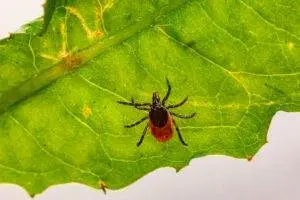
Red, circular rash that looks like a “bulls-eye?” Joint pain, muscle aches, and fatigue? These are signs that a person may have Lyme disease, an infectious disease that humans can contract when they are bitten by an infected tick. Lyme, a bacterial infection, can take a while to develop, and can cause chronic symptoms if it is not treated effectively. Acupuncture and TCM offer an alternative or adjunct way to help resolve the painful, debilitating symptoms of long-term Lyme disease.
Lyme disease is a type of bacterial infection transmitted by ticks. Ticks are parasitic arachnids, small spider-like creatures who bite other animals and feed on blood. If a tick is infected with a disease, it can infect the person or other animal it bites. Lyme disease, which is caused by the Borrelia burgdorferi bacterium, is just one of several infectious diseases that ticks can spread, including Rocky Mountain Spotted Fever (RMSF).
These critters are sometimes called “deer ticks” or “bear ticks” because they generally thrive in forest environments where they live symbiotically with these kinds of animals. But being bit by deer tick (tick on deer) doesn’t only happen in deeply wooded areas; anywhere that deer, squirrels, lizards, or birds may come into suburban areas, it is possible to be bitten by a tick. Actually, ticks, and therefore the infectious diseases they carry, are growing more prevalent because of humans encroaching into animals’ habitats. Tick bites most commonly occur in spring and summer.
Ticks do not fly; they can only get onto dogs or humans by crawling on them. This can happen quite easily if a tick is on a bush or other plant, and a person or dog brushes up against it. Ticks attach themselves to a host, and slowly suck their blood.
Lyme disease in dogs cannot be transmitted to humans, nor is lyme disease contagious, passing from human to human; you can only get Lyme disease by being bitten yourself. In order to pass Lyme disease to a person, a tick generally has to have been attached to that person’s skin for 36 hours or more. Ticks can be as small as the head of a pin, and they burrow in moist, hairy areas of their host’s body, so it is actually quite easy to have a tick on you without knowing it. After the tick drops off, a person may not feel anything at all, or only have a small, red bump that resembles a mild insect bite. In some cases, though, a person may feel right away that the area of the bite is hot, swollen, or causing a burning sensation.
If the tick was carrying Lyme disease, it can take several days to a few weeks for the more serious symptoms of Lyme to develop. Even then, the symptoms are not necessarily distinctive.
The early symptoms of Lyme disease can feel like a flu; fever, fatigue, aches and pains. Not everyone infected with Lyme will have the characteristic tick bullseye rash that develops around the site of the tick bite. When treated promptly with antibiotics, most cases of Lyme disease will resolve within a few weeks. However, many cases of Lyme disease are not diagnosed right away, and if it goes undetected, chronic problems can develop in the ensuing months. Once the bacteria has spread throughout the body, even a long course of antibiotics may not be able to get rid of it. Long-term Lyme symptoms may appear similar to other chronic inflammatory, autoimmune, or neurological conditions, such as fibromyalgia, Bell’s palsy, MS, chronic fatigue syndrome, or PTSD.
In extreme cases Lyme disease causes shoulder pain, hip pain, knee pain, fatigue, and other symptoms so severe that people can’t go about their regular daily routine. Sometimes diagnosis and treatment is further complicated by coinfections: concurrent other infections, that can also have been transmitted via the tick bite, or occur independently of it. Lyme and other tick-borne illnesses like RMSF can also trigger sepsis infections, which can be life-threatening, or lead to chronic pain, and/or PTSD (post-traumatic stress disorder). An MRSA skin infection (Methicillin-resistant Staphylococcus aureus), a type of staph infection that enters the skin through a wound, can develop around the infected tick bite; this staph skin infection is particularly resistant to antibiotics.
Unfortunately, symptoms of Lyme can become progressively worse over time, leading to disability and even death. Acupuncture and TCM offer an alternative for helping to heal Lyme disease, whether it is still in the early stages, or when it has become a chronic infectious disease.
Top 10 Symptoms of Lyme Disease

Signs of Lyme disease develop slowly, in stages, and can vary widely from person to person. Without the presence of the tell-tale bulls’ eye rash, both patients and doctors may have difficulty linking the spectrum of symptoms to a Lyme infection.
- Joint pain, swollen joins, arthritis
- Neuropathy, numbness or tingling, Bell’s palsy (face drooping)
- Fatigue
- Bulls-eye rash, also known as erythema migrans rash
- Headaches, migraines
- Sleep problems, sleep apnea, snoring
- Brain fog
- Trouble breathing
- Vertigo, dizziness
- Blurred vision
Other possible symptoms of Lyme include: ringing in the ears (tinnitus), heart palpitations, problems with memory and concentration, vision problems or inflammation around the eyes, and liver problems, like hepatitis. Symptoms of lyme disease in dogs are similar to those in humans, including stiff, swollen joints, tiredness, and loss of appetite.
Long-term effects of Lyme disease are sometimes referred to as “post-treatment Lyme disease syndrome.” Doctors are not sure why some people, even after being treated with antibiotics, seem to still be affected by long-term effects of Lyme disease.
Medical Diagnosis and Treatment of Lyme Disease
Getting a clear diagnosis of Lyme disease can be difficult. Currently, there is a two-step diagnostic process recommended to determine if a person has contracted Lyme disease. Two main kinds of tests can detect antibodies the body’s immune system creates to fight off the infection. However, it takes a while–at least several weeks, usually–for the body to build up enough of the antibodies that they become detectable. Often when people are aware early on that they may have been infected, and they get a test, it turns out to be negative. Usually, doctors try first one type of antibody test, and then the other to see if they get a positive result. Even then, medical science acknowledges that many (perhaps half of) Lyme disease cases are not detected this way.
A newer, still somewhat unproven form of testing involves taking a blood culture and trying to grow the bacteria that cause Lyme in a laboratory setting. This testing is more advanced and may be difficult for patients to access.
Once physicians have determined that Lyme infection is present, the usual treatment is a course of antibiotics that lasts a few to several weeks. In many cases, this seems to clear up the infection. In others, though, the antibiotics do not resolve the myriad symptoms patients are experiencing. Using antibiotics on a long-term basis is often not effective, and carries other risks to a person’s health.
Ongoing joint pain and inflammation is then usually treated with steroid medications or NSAIDS. Sleep problems and fatigue are often treated with antidepressants. These medications may help relieve symptoms temporarily, but they come with side effects, and do not address the root causes of the chronic symptoms of Lyme disease.
3 Stages of Lyme Disease
When early detection occurs, the Western medical approach of using antibiotics can often resolve Lyme disease within a few to several weeks. However, if the infectious disease is not found soon enough, Lyme disease will progress to more advanced stages. TCM methods can be helpful during all three stages of Lyme.
- First Stage Lyme disease – Within the first few weeks of the infection, and with early detection, antibiotics can be very helpful, working pretty well to stop the spread of the bacteria. However, because Lyme disease is often misdiagnosed, many people do not receive this treatment soon enough. During this phase, the symptoms are similar to those of the flu: chills, fatigue, heaviness in the limbs. As the infection moves in deeper, it can cause the skin rash, or hives. TCM treatment during the first stage will focus on clearing heat and detoxifying the body to rid it of infection.
- Second Stage Lyme disease – If the bacteria causing Lyme disease is not halted in its spread, it begins to affect the organs and the blood. The central nervous system and heart can become infected. These infections can last for months, and if not taken care of, can develop into the third phase. This is when a person may begin to feel joint aches, and arthritis-like symptoms. The body’s Qi and blood become deficient. Treatment with acupuncture and herbs at this point will work to help boost the Qi, clear heat and strengthen the whole immune system, and clear inflammation.
- Advanced stage Lyme disease – As the infection drags on, it can cause joint, skin, and nerve damage can take hold. Ongoing Qi and blood deficiency and stagnation cause fatigue, dizziness, insomnia, and memory loss.
A TCM provider will recognize what stage of Lyme disease a patient is in according to their symptoms, and customize the acupuncture points and herbal formulae used depending on their needs.
Acupuncture for Infectious Diseases

For millennia, TCM has recognized a type of disease that is caused by infection and can affect all systems of the body. We call this type of illness Gu zheng, or “Gu syndrome.” This classification covers illnesses caused by “invisible” pathogens, like viruses, funguses, and parasites. Along with the toxins from the tick bite, we consider how pathogens like heat, wind, and dampness all play a role in the illness. According to TCM theory, extreme heat in the body is also considered “toxic.” This category of condition helps us understand a variety of different systemic inflammatory illnesses, and gives us a framework for addressing each individual’s presenting symptoms.
One of the key features of Gu syndrome illnesses is how terrible and hopeless they can make people feel. Not only do people suffering from chronic inflammatory or immune-related conditions feel constantly tired and ache-y, but some of the sensations seem to come and go and feel so mysterious that they can’t be explained satisfactorily. If this is then compounded with the fact that many doctors don’t understand or know how to deal with the illness, it can leave patients feeling very frustrated and helpless. After months or years of this, debilitating physical symptoms may be accompanied by feelings of depression and anxiety.
A Yale Medical University study of patients, all in their 40s, suffering from long-term Lyme complications found that they had to reduce their activities, or even give up working, and doubted that they would ever recover. In interviews, patients made it clear that working with doctors who were more holistic was far preferred, and thus many had turned to CAM (complementary and alternative medicine) providers for help with Lyme disease.
Making a full recovery from long-term Lyme disease is possible, but it can take a long time to get rid of a bacterial infection that has woven itself deeply into the body’s organ systems. The benefit of Chinese herbal medicine for Lyme is that the powerful substances in the herbs can penetrate deep into the body at a cellular level. Working with an experienced acupuncturist means that your Chinese herbs for Lyme disease can be regularly updated, according to your individual needs, as you progress. This, in combination with acupuncture treatment for Lyme disease, moxibustion, and nutrition guidelines for an anti-inflammatory diet can all help patients feel better faster and prevent any further damage to the organs and the nervous system. Our TCM detox program may also be helpful.
Top 5 Tips for Lyme Disease Self-Care
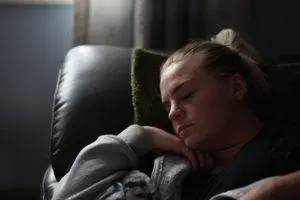
Sometimes re-prioritizing health over all else is necessary in order to heal from a serious infectious disease.
- Conserve energy. Rest as much as possible.
- Drink extra water.
- Eliminate coffee, alcohol, spicy foods, chips, roasted nuts, any food that adds heat and inflames further. Try to reduce heat.
- Eat more cooling foods. Mung bean tea is an ideal choice.
- In the later stages of the disease, we may need to add more strengthening foods, like chicken stock and soup, and will recommend different herbal formulae, as well.
Overall, reducing stress and finding a meditation practice is helpful. For more detailed instructions on how to eat right to reduce inflammation, see our article specifically addressing anti-inflammatory food and lifestyle choices.
Acupuncture Near Me for Lyme Disease
Dealing with a complicated illness like Lyme disease is challenging for people and doctors. A long process of discovery and commitment may be necessary. Working with an experienced TCM provider gives patients the benefits of a multi-pronged, holistic way of addressing multiple symptoms, both physical and emotional. Acupuncture for infectious diseases like Lyme takes into account each patient’s individual concerns, and addresses the complex symptoms of Lyme in concert.
*This article is for education from the perspective of Traditional Chinese Medicine only. The education provided by this article is not approved by FDA to diagnose, prevent, treat and cure human diseases. It should not stop you from consulting with your physician for your medical conditions. Traditional Chinese Medicine is based on Qi, which is an invisible force that usually cannot be observed by modern science. Because science focuses on testing ideas about the natural world with evidence obtained through observation, these aspects of acupuncture can’t be studied by science. Therefore acupuncture and Chinese herbs are often not supported by double-blind, randomized trials, and they are considered alternative medicine therapies in the United States.
How to Treat Lupus With Acupuncture and TCM
By Qineng Tan, L.Ac., Ph.D. & Xiaomei Cai, L.Ac., Ph.D.
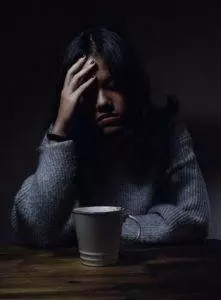
What is Lupus? Lupus is considered a chronic autoimmune disease, a condition which causes the immune system to attack the body’s own normal tissues. The most common lupus symptoms are extreme fatigue and a particularly characteristic lupus butterfly rash, a skin rash that appears on the face. Acupuncture and TCM treatment for lupus can help to relieve joint pain, inflammation, rashes, and fatigue.
Lupus is much more common in women than in men, and usually first appears during a woman’s reproductive years – between the ages of 18-45. About 90% of people who have lupus are women. Women of color have an even higher risk of developing lupus.
As with other autoimmune diseases, the precise causes of lupus are somewhat mysterious. What causes lupus is still not clear to medical researchers. It may have something to do with a person’s genetic makeup. Because lupus is so much more common in women, it is believed that it may have something to do with estrogen, the female hormone.
There are different types of lupus. Systemic lupus erythematosus (SLE lupus) is the most common form of lupus, and it can affect the whole body, causing widespread inflammation and serious chronic fatigue.
Cutaneous lupus erythematosus primarily affects the skin, causing rashes, skin lesions (discoid lupus), irritated blood vessels, photosensitivity, and hair loss. The most common chronic form of cutaneous lupus is discoid lupus erythematosus, which causes scaly, round lesions to form on the skin. People with skin lupus are very sensitive to sunlight and must take precautions to avoid too much sun exposure, or even fluorescent lights. Lupus rash may resemble a bad sunburn.
Lupus nephritis is a form of lupus that can negatively impact kidney function. Inflammation of the kidneys can lead to high blood pressure, or excess protein or blood in urine.
It can often take a long time to get a lupus diagnosis. There is no one test that can conclusively show that a person has lupus. Doctors will generally look at a person’s range of symptoms, and run a variety of lab tests. An antinuclear antibody test (ANA) can indicate if the body’s immune system is producing autoantibodies–antibodies that attack normal tissue. Lupus symptoms can change, seeming to come and go, or “flare-up” when a person is triggered by something in their environment–often light exposure or emotional stress. During other periods of remission, symptoms abate, and a person with lupus may feel well for a while until another flare occurs.
Often lupus causes extreme fatigue, to the extent that people may find it difficult or impossible to get on with their daily work and activities when they are in the throes of a flare-up. The combination of chronic pain and chronic fatigue can lead to feelings of depression. With this kind of disease, a defeating sort of cycle can develop, in which stress, anxiety, pain, and fatigue keep feeding and perpetuating each other. Lupus is also associated with fibromyalgia; sometimes the two conditions overlap. Lupus also bears some similarities to Ehlers-Danlos Syndrome (EDS), and inherited connective tissue disease.
There is currently no cure for lupus. Medical treatment usually involves the use of medications like corticosteroids to reduce inflammation. Acupuncture and TCM can be used as an alternative or adjunct therapy for lupus, as acupuncture can help alleviate systemic inflammation, reduce joint pain, and help to improve fatigue. Acupuncture can also help to relieve the physical and emotional effects of stress and depression.
Top 10 Lupus Symptoms
Lupus can affect each individual person differently. Signs of lupus that might occur in both men and women include:
- Fatigue
- Joint pain and swelling
- Swelling in hands, feet, and/or around the eyes
- Headaches
- Low grade fever
- Butterfly rash on face, sores around the mouth and/or nose (lupus erythematosus)
- Hair loss
- Sensitivity to light
- Raynaud’s disease – loss of sensation in digits, finger and/or toes turn yellow, white or blue when cold, or under stress
- Chest pain when taking a deep breath
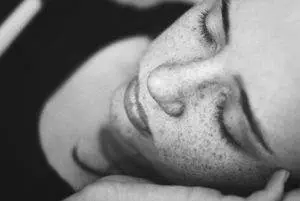
The lupus butterfly rash, also known as “malar rash”, may be the most distinctive symptom of lupus; it covers the cheeks and nose. The rash is red and patchy, caused by the dilation of capillaries under the surface of the skin, known as erythema, or lupus erythematosus. This lupus rash does not appear in every case, but it may appear in the majority of cases.
Other lupus symptoms can include: sores around the mouth, dry eyes, a rash around the eyes, problems with memory, a tendency towards anemia, an enlarged spleen, and a higher risk of blood clots.
Lupus anticoagulant (LA) is an antibody that is abnormally produced in some people with lupus. While its name sounds like it works against clotting; it actually does the opposite. High levels of LA can cause inappropriate blood clotting, or thrombosis. This problem can cause increased risk of miscarriage in women. Some people have LA without necessarily having lupus.
Women may experience menstrual problems like irregular periods or heavy bleeding that are related to lupus. Women with lupus are also at a higher risk for developing heart disease, kidney disease, and osteoporosis. Lupus symptoms women of color, in particular, (African-American women and Hispanic women) may develop are serious complications related to lupus at a younger age, including an increased tendency to suffer from seizures, strokes, and swelling around the heart.
Lupus Treatment
Rheumatologists specialize in treating musculoskeletal problems and the autoimmune diseases that often cause joint pain and inflammation, like rheumatoid arthritis, osteoarthritis, fibromyalgia, Lyme disease, and gout, as well as lupus.
Symptoms of joint pain due to lupus are usually treated with steroid medications like prednisone that help to reduce inflammation. Hydroxychloroquine, (an anti-malarial medication), is often prescribed to help prevent flares of symptoms from SLE lupus. Unfortunately, both of these types of medications can cause serious side effects, especially when they are used on a long-term basis. They do not address the root causes of lupus.
A relatively new treatment for lupus, Benlysta, is administered intravenously. It works by blocking a kind of protein that is involved in the production of autoantibodies – the immune cells that attack healthy tissues. This treatment, while different from other immunosuppressive drugs, can also cause side effects, including being more susceptible to infections. Some people have a severe allergic reaction to Benlysta, while others experience insomnia and severe depression.
Acupuncture for lupus and other rheumatologic conditions offers relief from painful symptoms and chronic fatigue without negative side effects.
How Can Acupuncture Help Lupus?

Lupus manifests as massive systemic inflammation in the body: in the tissues, organs, skin, and joints. Western medicine tends to always rely on cortisone/steroids to deal with inflammation, but this only works temporarily, like a band-aid.
Even though we don’t know exactly what causes lupus, we do know it is an endocrine disorder, or an inherited condition, or something in the environment that is causing the body’s atypical autoimmune response.
According to TCM, inflammation comes from too much heat in the body, or what we call “empty heat:” a lack of fluid. Without sufficient water, the body can’t control excess heat. We call this yin deficiency or kidney yin deficiency. This excessive heat condition can be triggered by external forces like the heat and light of the sun’s rays, or by spending a lot of time in a hot, dry space with a heater and no humidifier. This is part of what might cause the inflammation, fevers, and skin rashes associated with lupus.
Lupus nephritis, which involves the kidneys, is viewed by TCM as being related to deficiencies of qi or yang energy in the kidneys and spleen. Blood stasis can also be a part of the presentation. Treatment with acupuncture and herbs will often focus on removing blockages that cause stagnation of blood and qi, strengthening the kidneys, and clearing heat and toxins from the body.
Clinical trials in China have compared patients with SLE lupus treated with prednisone only to those treated both with steroids and Chinese herbs, and found that patients receiving TCM treatment as an adjunct fared better overall and were able to reduce their use of the steroids.
One study showed that 80% of participants experienced a significant improvement in joint pain, fatigue, and skin rash after ten sessions of acupuncture treatment.
Another case study of patients with discoid lupus showed that lesions had improved by 87% after receiving a course of auricular-acupuncture (ear acupuncture) therapy.
Top 3 Tips for Helping Lupus Naturally
Reducing inflammation at its source usually means making some changes in behaviors. Not only lupus, but other chronic illnesses like cancer, rheumatoid arthritis, etc. have so much to do with lifestyle and habits that are not conducive to optimal health. For a more thorough discussion of how to eat right and manage your habits to reduce inflammation, see our blog article specifically addressing Inflammation. Here are some basic anti-inflammatory habits to embrace:
- Reduce or eliminate all non-necessary drugs and medications. Long-term reliance on drugs to cover up pain hampers your ability to know what is really going on with your body. It also potentially damages the immune system and organs.
- Reduce or eliminate foods that create more heat and and acidity in the body. This includes coffee, alcohol, red meat, spicy foods, and crispy, fried foods. TCM nutrition provides very specific guidelines for warming and cooling foods, so working with a qualified acupuncture professional will be very helpful to each individual patient.
- Get adequate sleep – ideally, eight hours every night. This is when the immune system repairs itself. When people go for years, only sleeping three or fours hours a night, they can do serious damage, causing massive problems like lupus to develop.
It is up to you to care for your body as if it were your most precious resource, because it is. When you make your health your top priority, every decision you make about what to eat, when to sleep, and how to spend your time and energy matters. Be mindful of your own needs; don’t cover up your pain with drugs, or trash your body with junk food. Your best chance for a happy life starts with healthy habits.
Acupuncture Near Me for Lupus
Autoimmune disorders like lupus can be devastating, not only because they are physically and mentally debilitating, but because they can be so difficult for doctors to understand and treat effectively. The TCM approach to lupus is holistic and takes into consideration a person’s foundational constitution, lifestyle, and emotions, as well as looking carefully at which imbalances in the organ systems are causing the physical symptoms. If you have been diagnosed with lupus, or are not sure about what might be causing severe fatigue, joint pain, or skin rashes to flare up periodically, working with an experienced acupuncture practitioner may help you to manage these symptoms and experience a marked improvement in your quality of life.
*This article is for education from the perspective of Traditional Chinese Medicine only. The education provided by this article is not approved by FDA to diagnose, prevent, treat and cure human diseases. It should not stop you from consulting with your physician for your medical conditions. Traditional Chinese Medicine is based on Qi, which is an invisible force that usually cannot be observed by modern science. Because science focuses on testing ideas about the natural world with evidence obtained through observation, these aspects of acupuncture can’t be studied by science. Therefore acupuncture and Chinese herbs are often not supported by double-blind, randomized trials, and they are considered alternative medicine therapies in the United States.
How to Treat Bloated Stomach With Acupuncture and TCM
By Xiaomei Cai, L.Ac,. Ph.D. & Qineng Tan, L.Ac., Ph.D.
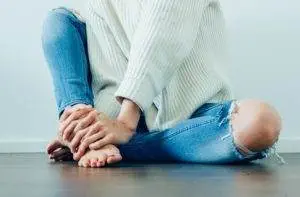
Do you feel constantly gassy or have a bloated stomach after eating? Digestive problems like gastritis or colitis can cause abdominal bloat. Stress and hormonal imbalances can also contribute to inflammation and bloated stomach pain. Acupuncture and TCM herbs can help improve digestion and relieve abdominal bloating.
Abdominal bloating occurs when gas builds up in the gastrointestinal tract, filling the stomach and/or intestines with air. This can cause the belly area to get swollen and distended. Bloating can cause an inflated belly, sharp pain in the abdomen, belching and flatulence, nausea, or a sudden strong urge to go to the bathroom. Bloating can be related to fluid retention; this is sometimes called “water bloat.”
Problems with digestion that lead to a feeling of heaviness, “like a rock” in your belly after eating, are common. People who have been diagnosed with some type of functional gastro-intestinal disorder (FGID)–like irritable bowel syndrome (IBS) or dyspepsia (indigestion)–are extremely likely to experience abdominal pain and bloating after eating, while up to 30% of all people report having bloating at least some of the time. Inflammation in the walls of the stomach (gastritis) or intestine (ulcerative colitis) can also cause bloating.
Women often feel bloated before or during their menstrual period, and female reproductive disorders like endometriosis, fibroids (leiomyoma of the uterus), and PCOS (polycystic ovarian syndrome) can cause abdominal pain and bloating.
FGIDs can be very hard to manage; it may be difficult to get a clear diagnosis or effective medical treatment. Problems like constipation, diarrhea, nausea, abdominal pain and bloating are highly subjective, and people are often made to feel like it’s normal to have these issues, or that all they need to do is avoid certain foods.
Feelings of anxiety and depression are common among people who suffer from moderate to severe bloating on a regular basis. This can become a vicious cycle, as the pain and swelling of the abdomen causes anxiety, and the physiological effects of the emotional stress trigger the bloating to happen again and again. Sometimes people dread eating meals because they are so afraid of the painful and embarrassing bloated stomach.
Digestive upsets are complex to treat because there can be many factors contributing to the discomfort. So many different conditions can cause bloating, it can be hard to get a clear handle on the true cause. This is a case when TCM methods of diagnosis offer many advantages, because a TCM practitioner will be able to study the whole picture presented by a patient and pinpoint what underlying conditions are causing gas and distension. Acupuncture and herbs can help resolve abdominal bloating and other symptoms at their root source.
Top 10 Abdominal Bloating Causes

Why might someone feel bloated and gassy all the time? Many different types of gastrointestinal disorders can contribute to a bloated belly and excess gas, as can hormonal and emotional changes. What causes abdominal bloating can be one issue or a combination of factors:
- Irritable Bowel Syndrome (IBS)
- Inflammatory bowel disease, Ulcerative colitis or Crohn’s Disease
- Gastritis, stomach ulcers, inflammation of the stomach
- Food intolerance, gluten intolerance, celiac disease
- PMS, menstruation
- Stress, anxiety, depression
- Pregnancy
- Constipation
- Liver disease
- Abdominal adhesions, or scar tissue from surgeries
Eating behaviors like eating too quickly, swallowing air while eating, or eating fiber-rich foods that cause gas like beans, can lead to bloating. Drinking a lot of carbonated beverages can lead to excess gas in the GI tract. Smoking can also be a factor. Some medications can cause bloating as a side effect, including antibiotics, oral birth control pills, opioid pain medications, medicines to relieve constipation, and even some supplements, like iron pills.
Cancers of the abdominal organs, such as ovarian cancer, stomach cancer, colon cancer, or pancreatic cancer, can also cause bloating in the belly. Gallstones or gallbladder disease, gastroparesis, kidney problems, and liver problems can all cause stomach pain and bloating.
Medical Treatment for Abdominal Bloating
Many people do not seek medical help for bloating, trying to manage it on their own with over the counter medications that promise relief from gas pain and acid reflux. Antacids only help with the kind of bloating that is caused by food, though; they don’t help with bloating related to FGIDs, hormones, or emotional stress. When a person does ask their primary care doctor or even a gastroenterologist for help with bloating, they may find that the treatment options are very limited. Doctors will usually reassure patients that gas and bloating, while uncomfortable, are not actually dangerous. Then, they will often advise that patients go on a strict elimination diet, cutting out wheat, dairy, and most vegetables and legumes. Sometimes doctors will prescribe antibiotics to alter the balance of gut bacteria. Antidepressants are sometimes prescribed to help with bloating. Conventional medical science still has a ways to go to fully understand the underlying causes of digestive problems like bloating.
Because bloating is not viewed as a disorder in and of itself, not much serious research has been done to show what types of treatments work best to get rid of bloating. TCM treatment has been shown in a randomized controlled trial, a peer-reviewed study, and a hospital-based investigation to help in relieving stomach pain due to chronic gastritis.
How Can Acupuncture Help With Bloating?
TCM offers a multidisciplinary approach to the digestive problems, hormone imbalances, and emotional upsets that can cause bloating. An experienced acupuncturist is able to use methods of diagnosis such as studying the appearance of the tongue, feeling the pulse, and asking lots of questions about how and when the symptoms occur to find the specific pattern of imbalance that is causing gastric distress.
Different presentations of digestive conditions that may cause abdominal bloating and pain include:
- Spleen/Stomach Deficiency – characterized by symptoms: chronic bloating, poor appetite, feel worse after eating, pallor, and fatigue. This type of bloating can be caused by antibiotics, too much raw or fermented food, eating disorders, a long period of illness, or chronic inflammatory disorders.
- Damp-Phlegm – symptoms include: distended stomach, nausea, acid reflux, diarrhea. This type of bloating can be caused by dietary habits that include excess sugar, alcohol, fatty or fried foods, and dairy products. Can also be related to damp environmental conditions.
- Liver Qi stagnation – common symptoms are: stomachaches, stomach gurgling, belching, and constipation. This type of bloating can be caused by stress, feelings of anxiety or anger, and irregular, emotional eating behaviors.
TCM treatment for abdominal bloating will use acupuncture and herbs to bring the stomach and liver back into harmonious function, clearing phlegm and improving digestion. Treatment will be individualized based on the underlying causes of the imbalance; if reproductive hormones are involved, then that factor will be taken into consideration when preparing the herbal formula. If mental health issues are a factor, specific points will be added to help relieve anxiety. Naturally, your acupuncturist will have some clear instructions on how to optimize your nutrition to reduce bloating.
Top 5 Tips for How to Stop Bloating

While bloating may be caused by all sorts of different factors, there is no doubt that making some changes to your eating habits will probably have an impact on how bloated you feel. What helps bloating may be different for each person’s constitution or lifestyle, so it will be very helpful to have an in-depth conversation with your acupuncture provider about what bloating diet is best for you.
- Chew your food thoroughly. Many people eat fast, and don’t pay much attention to chewing their food well before they swallow. Food is really meant to be broken down and mixed with saliva in the mouth before it moves down the esophagus and into the stomach. Skipping this important step by swallowing half-chewed food means that your stomach has to produce more acid and work much harder to digest the food before it moves deeper into your gastrointestinal tract. Eating too quickly can also easily lead to eating more than you need. It takes about 20 minutes for your brain to receive the message that the stomach is full. Chew slowly, and enjoy every bite; this will improve your digestion.
- Avoid icy cold drinks and foods. Cold liquids are shocking and unfriendly to your internal organs, both those of the digestive tract and the female reproductive organs. Constantly drinking ice-cold beverages irritates the smooth muscle tissues of the stomach, intestines, and uterus. Drink more warm liquids, which are soothing to these organs.
- Ginger tea – many of our herbal formulations include slices of fresh ginger to help soothe the stomach and GI tract. Ginger helps the body to produce more of the digestive enzymes that work to break down food, and relieves cramping in the belly. All you need to do is keep a knob of fresh ginger on hand, cut two or three slices and steep in hot water as you would a teabag. Sip anytime, but especially before meals, to help relieve gastritis pain and bloating.
- Choose foods in harmony with the season. Raw foods are appropriate in the summer, but in the winter, it’s better to eat cooked foods. Eating more bitter-tasting foods, like dark leafy greens, helps the liver and kidneys.
- Use acupressure to help relieve bloating and gassiness. Acupoints are located along the meridians and correspond to various organ systems. Applying gentle, steady, downward pressure to acupoint ST36 (Zu San Li), which is associated with the stomach, can help to relieve bloating, stomach pain, nausea, and feelings of stress. ST36 is located on the outer edge of the shin bone, about 4 finger widths beneath the kneecap.
Acupuncture Near Me for Abdominal Bloating
TCM offers a holistic approach to digestive problems of all kinds. Symptoms like abdominal bloating, stomach pain, and gassiness are usually signs that there is a deeper problem. If you haven’t been able to solve the problem of bloating with conventional medicine or dietary changes, you may be able to get help for digestive difficulties with acupuncture and herbs.
*This article is for education from the perspective of Traditional Chinese Medicine only. The education provided by this article is not approved by FDA to diagnose, prevent, treat and cure human diseases. It should not stop you from consulting with your physician for your medical conditions. Traditional Chinese Medicine is based on Qi, which is an invisible force that usually cannot be observed by modern science. Because science focuses on testing ideas about the natural world with evidence obtained through observation, these aspects of acupuncture can’t be studied by science. Therefore acupuncture and Chinese herbs are often not supported by double-blind, randomized trials, and they are considered alternative medicine therapies in the United States.